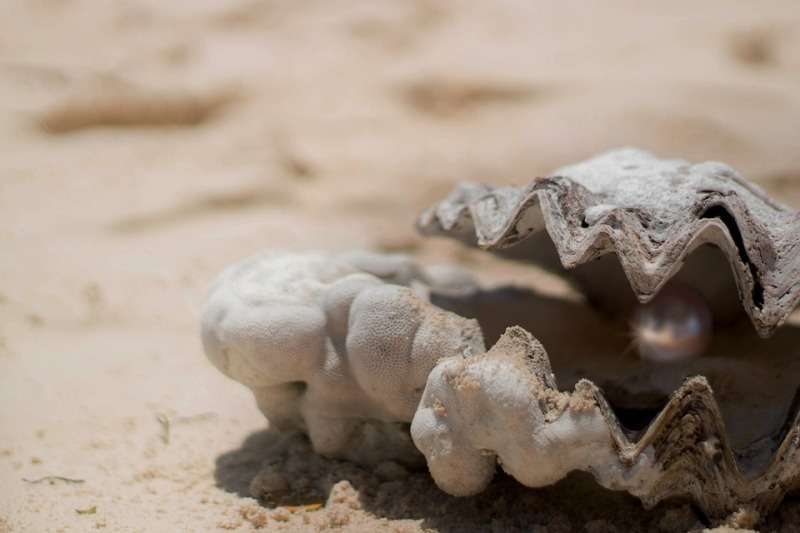
I remember when I was little and I was given a pearl necklace (with very small pearls but nonetheless very impressive to myself as a young girl). I understood that pearls were something fancy, elegant, and special.
When I was older I learnt why pearls are so special. They don’t automatically happen inside every clam but only happen in the clams that have had a piece of grit get inside the soft flesh inside the clam’s shell.
The clam then responds by covering up this irritating piece of grit with layers of smooth substance which forms what we know of as a pearl. The clam takes something irritating and painful and turns it into something beautiful and precious.
In society today, at least in the Western society, this is becoming a practice that we are swiftly giving up on. Instead of using adversity and hardship to shape us as people and creating something beautiful out of it, we are simply cutting out anything unpleasant or difficult in our life and retreating behind the wall of self-care.
What is self-care?
Self-care is an important part of life. In fact, I am frequently encouraging my friends who are mums that they should do something for themselves when I’m able to come around during the day to babysit.
Yet self-care no longer simply means to be able to take a small amount of time out of your schedule to do something relaxing and enjoyable for yourself. It has come to mean constantly doing whatever you feel like whenever you feel like it, even to the point of cutting people out of your life for insignificant reasons.
I definitely agree that if you are in a situation where you are facing danger from someone, you should remove yourself from that situation and take steps so that they cannot cause you any more trouble such as reporting their behaviour to the police.
A less serious occasion may be having to have an honest conversation with a friend about how you really appreciate them but don’t think you two would be suitable flatmates as you don’t want to jeopardise the friendship by living together.
These cases are cases where it is healthy and appropriate to limit contact with people but in today’s society it seems that people are cutting other people out of their lives simply because they’re an inconvenience, they say something they don’t like, or they have faced some form of conflict in the relationship.
Self-care is about looking after yourself so that you can look after other people. The point of self-care is a happy, healthy you, so that you can be at your best to be serving other people. We need time to relax, refresh, and recharge but not so that we can continue going about serving ourselves and our needs.
We are meant to be in community with one another, not simply living individual self-focused lives.
How too much ‘self-care’ is hurting us...
In the first few days of this year, the ‘self-care’ hashtag was used a staggering 10.9 million times – it was the hashtag that ruled for this year's New Year’s Resolutions. For the first time in decades self-help books are back in with a massive 56% increase in sales over the last three years.
The focus is definitely on ‘me’ and how we can focus on ourselves; yet this doesn’t seem to be producing the results that are desired.
A report from the Ministry of Justice from 2018 shows that suicides have increased for the fourth year in a row and that at the time of the report, suicides are the highest they have been since they started officially recording them in 2007-2008.
Someone could say that perhaps we need so much self-care because of so many people being depressed and committing suicide but I think it is the opposite. All the self-care that is being thrown around isn’t doing the job it is meant to so people are giving up on life and tragically deciding that they’d rather not be around any more.
What God and science say will make us happy
Surprisingly, although it should really come as no surprise, both God and science agree on what will make us the most happy.
In Acts chapter 20, verse 35, God says “It is more blessed to give than receive.”, and in Luke chapter 6, verse 38 his word says “Give, and you will receive. You will be given much. Pressed down, shaken together, and running over, it will spill into your lap. The way you give to others is the way God will give to you.”
In accordance with this, scientists have discovered that when you genuinely do good for another person, you experience an increase of endorphins which make you feel happy and less stressed and that having your stress levels lowered this way can contribute to a longer happier life.
They’ve also done studies with people with depression and other illnesses and discovered that helping others and gratitude have a big positive effect on them.
Treating yourself to something nice is good in moderation but what really helps according to both God, the author of life, and science is helping others and being grateful for what we already have. Let’s make 2019 not the year of ‘self-care’ but the start of ‘other-care’ because in caring for others we find we are actually caring for ourselves too!
 Jessica McPherson lives with her best friend and husband, Eoin and their family of rescue animals in Christchurch. She loves reading, writing, photography and scrap-booking but most of all sharing God’s love and truth with a hurting world. Jessica is particularly passionate about encouraging children and building them up in gospel truth.
Jessica McPherson lives with her best friend and husband, Eoin and their family of rescue animals in Christchurch. She loves reading, writing, photography and scrap-booking but most of all sharing God’s love and truth with a hurting world. Jessica is particularly passionate about encouraging children and building them up in gospel truth.

Jessica McPherson lives with her best friend and husband, Eoin and their family of rescue animals in Christchurch. She loves reading, writing, photography and scrap-booking but most of all sharing God’s love and truth with a hurting world. Jessica is particularly passionate about encouraging children and building them up in gospel truth.